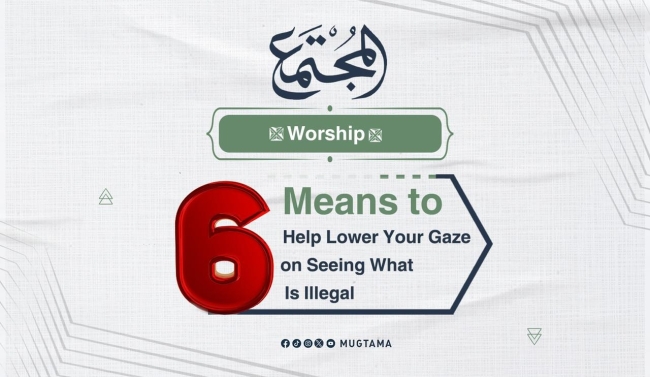Allah’s blessings manifest in every part of existence, and when we reflect upon ourselves, we see the wonders of Allah's creation evidently. Among the remarkable and noble blessings Allah has bestowed upon us, which serve as pathways to knowledge and enlightenment, are the heart, hearing, and sight. The heart is the repository of knowledge, which reaches it either through the ear’s hearing or the eye’s seeing. Thus, Allah commanded us to preserve our hearing, sight, and hearts, as we are accountable for them, as He says, “And do not pursue that of which you have no knowledge. Indeed, the hearing, the sight, and the heart—about all those [one] will be questioned.” (Al-Isra: 36) (1)
Since sight is such a precious blessing, it is our duty to guard it and express our gratitude for it. Allowing one’s gaze to wander aimlessly is one of the harmful plagues of our time, a doorway to temptation that can lead to the corruption of the heart and the weakening of faith. In a world where moral standards have deteriorated and we are constantly exposed to temptations that are now part of everyday life, Islam offers us numerous means and methods to help us protect the blessing of sight.
- Seeking Help from Allah
Relying on Allah is the most crucial step toward achieving any goal. The struggle against Shaitan and one’s own desires can only be won through reliance on the Creator of one’s soul. Allah says, “And seek help through patience and prayer, and indeed, it is difficult except for the humbly submissive [to Allah].” (Al-Baqarah: 45) Additionally, the Prophet Muhammad (peace be upon him) said, “When you ask (for anything), ask it from Allah, and if you seek help, seek help from Allah.” (Narrated by At-Tirmidhi).
- Be Mindful of Allah Constantly
Being mindful of Allah at all times, knowing that He observes and witnesses everything, instills a sense of piety in every action and fosters fear from His punishment. This consciousness makes a person weigh each glance and think carefully, aware that Allah is always watching. Allah says, “He knows that which deceives the eyes and what the breasts conceal.” (Ghafir: 19) Maintaining such awareness is achievable through regular dhikr (remembrance of Allah), du’a, and contemplation on the promised reward for those who are mindful of Allah’s commands.
- Striving Against the Self and Aspiring High
The believer must fight against his own desires, resisting temptations and worldly distractions, instead of allowing himself to be easily led astray by Shaitan and the whims of his soul. The Prophet Muhammad (peace be upon him) said, “And the mujahid is he who strives with himself regarding obedience to God.” (Reported by Ahmad) When Allah sees the sincerity and determination of a believer to struggle against his desires, He helps him along this path, as He says, “And those who strive for Us—We will surely guide them to Our ways. And indeed, Allah is with the doers of good.” (Al-Ankabut: 69)
- Engaging in Worship Abundantly
The renowned scholar Ibn al-Qayyim (may Allah have mercy on him) said, “The self, if not occupied with good, will busy you with evil.” (2) Filling one's time with worship keeps one from falling into sin and temptations, leaving no space for indulgence in forbidden looks or acts. Salah, for instance, is a great help, as Allah says, “Indeed, prayer prohibits immorality and wrongdoing.” (Al-Ankabut: 45)
- Avoiding Forbidden Things
Avoiding viewing forbidden things such as immoral media content and indecent programs, which incite corruption, protects the heart from falling prey to sin. The Prophet Muhammad (peace be upon him) said, “The fornication of the eye consists in looking.” (Sahih al-Bukhari) Avoiding places filled with temptations and sinful attractions, where one is constantly exposed to immoral things, protects one from easily falling into sin. Allah says, “Tell the believing men to reduce [some] of their vision and guard their private parts. That is purer for them. Indeed, Allah is Acquainted with what they do.” (Al-Nur: 30)
- Sincere Repentance
Sincere repentance is the key to all goodness and a means to reform oneself after making mistakes. Naturally, one may occasionally falter, casting forbidden glances or inadvertently seeing what one should avoid, such as glimpsing an immodestly dressed person on the street. However, one must not tire of repentance, no matter how many times one repeats the mistake, as long as the repentance is genuine and he pledges to avoid the sin in the future. Allah says, “Except for those who repent, believe, and do righteous work. For them Allah will replace their evil deeds with good. And ever is Allah Forgiving and Merciful.” (Al-Furqan: 70)
A story that illustrates this beautifully is that of a young worshiper from Kufa (3) who was admired by a woman of beauty and intelligence. Despite her advances, he turned away, lowering his gaze out of fear of Allah. His piety, reverence, and fear of Allah saved him and her from potential sin, and she eventually repented and returned to Allah, because of by his steadfastness.
----------------------------------------------------------------------
- Tahdhib al-Tafsir wa Tajrid al-Ta'wil, by Ibn Shaybah.
- Al-Wabil al-Sayyib (1/111), by Ibn Qayyim al-Jawziyyah.
- Ithaf al-Sadah al-Muttaqin by Al-Zabidi.
- “Means Helping to Lower the Gaze,” islamqa.info.
- The Poisoned Arrow, from the Educational Memoirs series by Abdulrahman bin Foad Al-Jarallah.
- “Benefits and Rewards of Lowering the Gaze,” alukah.net.


